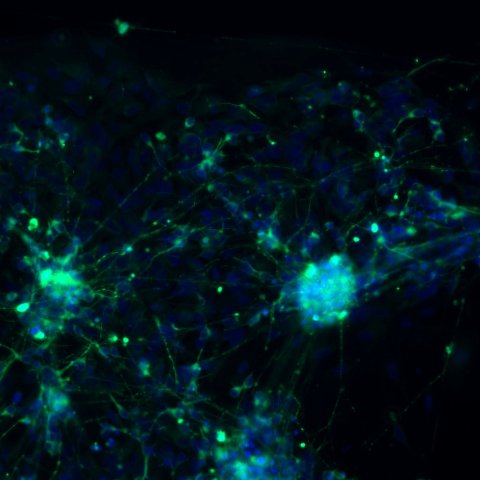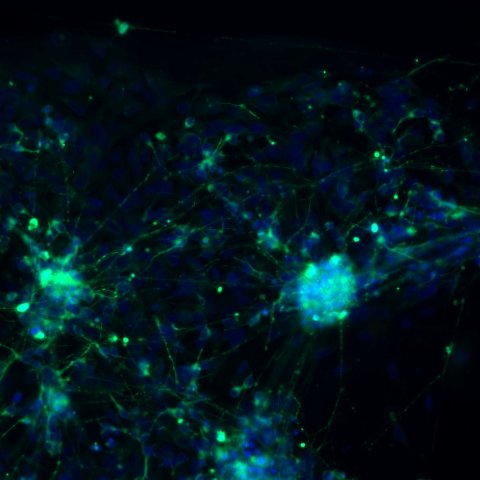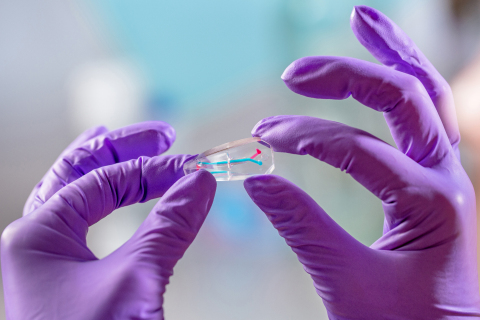BOSTON--(BUSINESS WIRE)--Emulate, Inc. announced today that it has received a research grant to use the company’s human Brain-Chip system and develop a fully automated research platform, to conduct experiments on the International Space Station. Studies will analyze the Brain-Chip, which consists of neuronal and vascular endothelial cells in a living micro-engineered environment. Experiments will be conducted under healthy and inflamed states to assess how space travel affects neuronal function.
The NIH’s National Center for Advancing Translational Sciences (NCATS) provided the award of $2 million. The Center for the Advancement of Science in Space (CASIS), the organization tasked by NASA to manage and promote research onboard the International Space Station U.S. National Laboratory, will coordinate the implementation of Emulate’s Human Emulation System to conduct research in space.
Freed from the effects of gravity found on Earth, the International Space Station provides an environment where researchers can study human health in microgravity, allowing them to decouple the force of gravity from other effects that can impact brain cell function. Different experiments using the Brain-Chip will study how other space travel stressors — such as hypergravity experienced during launch, reduced availability of oxygen known as hypoxia, and increased levels of stress hormones — influence brain function.
“We are honored to be selected for this research at the International Space Station which sets forth courageous goals to pioneer discoveries in space and to improve human health here on Earth,” said Geraldine A. Hamilton, PhD, President and Chief Scientific Officer of Emulate. “As we make our Human Emulation System available to labs throughout the world, we continue to push new boundaries. It's an exciting opportunity for us to collaborate with experts working in the space program so that we can leverage research with Organ-Chips in space and apply the learnings to human health challenges that are experienced on Earth.”
This project is also designed to provide insight into the relationship between inflammation and brain function, a very active area of investigation for furthering understanding of neurodegenerative diseases, such as Alzheimer's and Parkinson's. One particular aspect of the brain that the research will focus on will be blood–brain-barrier functionality. The blood-brain-barrier protects the brain by preventing unwanted substances entering the brain, and can be altered during inflammation. The studies will use the Brain-Chip to evaluate the efficacy of anti-inflammatory therapeutic intervention on the blood–brain barrier in space.
“Conducting research with Organs-on-Chips technology on the International Space Station is a remarkable opportunity to understand disease and improve human health,” said NCATS Director Christopher P. Austin, MD. “Physiological functions in the microgravity of the International Space Station will provide insights that will increase translational effectiveness on Earth, including identifying novel targets for drug discovery and development."
Emulate will adapt the instrumentation of its Human Emulation System in order to achieve the requirements for use of Organs-on-Chips technology on the International Space Station, which includes automation of experiments and size constraints. Technical developments will also include innovations to Emulate’s fluidic systems.
Emulate will work with two partners to develop space-compatible hardware. IRPI, a company that specializes in the design of fluid systems for space, offers unique terrestrial testing platforms to ensure the robustness of the systems in microgravity. The other partner is SpaceTango, a company that facilitates microgravity research using their experimental ecosystem onboard the International Space Station.
“The adaptation of our Organs-on-Chips technology for research in space advances new frontiers for designing the functionality of our system to be highly-automated, streamlined, and size-efficient,” said Chris Hinojosa, Director of Discovery at Emulate. “We are further optimizing our system to meet the requirements for use in space which, in turn, will enable us to improve our system for use by many researchers and companies on Earth.” Hinojosa will lead the team working on the project.
About the International Space Station U.S. National Laboratory and CASIS
In 2005, Congress designated the U.S. portion of the International Space Station (ISS) as the nation's newest National Laboratory to further improve life on Earth, promote collaboration among diverse users, and advance science, technology, engineering, and mathematics (STEM) education. In July 2011, NASA selected CASIS to maximize use of the ISS U.S. National Laboratory through 2020. Today, CASIS works to make this unique laboratory environment available to U.S. government agencies and academic and private institutions, providing them access to a permanent microgravity setting, a vantage point in low Earth orbit, and the extreme environment of space. For more information, visit www.iss-casis.org.
About the “Human Emulation System” Powered by Organs-On-Chips Technology
Based on the Organs-on-Chips technology, Emulate has created a new living Human Emulation System™ that provides a real-time window into the inner workings of human biology and disease – offering researchers a new technology designed to predict human response with greater precision and detail than today’s cell culture or animal-based experimental testing. Each of Emulate’s proprietary Organ-Chips – such as the lung, liver, brain, intestine or kidney – contains tiny hollow channels lined with tens of thousands of living human cells and tissues, and is approximately the size of an AA battery. An Organ-Chip is a living, micro-engineered environment that recreates the natural physiology and mechanical forces that cells experience within the human body.
About Emulate, Inc.
Emulate, Inc. is a privately held company that creates living products for understanding how diseases, medicines, chemicals, and foods affect human health. Our Human Emulation System™ sets a new standard for recreating true-to-life human biology and is being used to advance product innovation, design, and safety across a range of applications including drug development, agriculture, cosmetics, food, and chemical-based consumer products. Emulate continues to develop a wide range of Organ-Chips and disease models through collaborations with industry partners and internal R&D programs. Emulate is also working with clinical partners to produce Organ-Chips personalized with an individual patient’s stem cells, for applications in precision medicine and personalized health. Our founding team pioneered the Organs-on-Chips technology at the Wyss Institute for Biologically Inspired Engineering at Harvard University. Emulate holds the worldwide exclusive license from Harvard University to a robust and broad intellectual property portfolio for the Organs-on-Chips technology and related systems.





